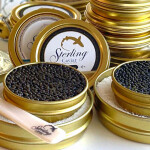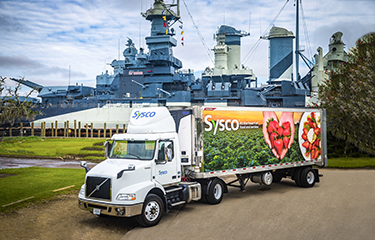U.S. Representative Jared Huffman (D-California) has called out Sysco for its ties to Chinese processors that allegedly employed Uyghur labor.
In a 14 December letter to Sysco Corporation President and CEO Kevin Hourican, Huffman linked Sysco’s supply chain to Shandong Haidu and Rongcheng Haibo, subsidiaries of the Chishan Group – a major Chinese seafood firm responsible for producing as much as 17 percent of processed squid imported by the U.S. from China. The Outlaw Ocean Project has published extensive evidence revealing the Chishan Group’s use of Uyghur workers; Under the U.S.’s Uyghur Forced Labor Protection Act (UFLPA), goods produced using Uyghur labor are not allowed to be imported into United States.
“I want to ensure that Sysco will demonstrate its commitment to upholding the law by severing ties with any entity that violates human rights standards,” Huffman wrote.
Huffman noted in his letter that after an “initial delay in action,” Sysco had terminated its contract with Shandong Haidu on 14 December, but that it has not dropped ties with Rongcheng Haibo.
“Rongcheng Haibo has been explicitly documented as using labor from Xinjiang workers. Therefore, is Sysco planning to sever ties to Rongcheng Haibo?” Huffman asked Hourican. “Please provide documentation that outlines the termination of Sysco’s relationship with Shandong Haidu in addition to any plans moving forward as it relates to Rongcheng Haibo.”
In a separate draft letter, addressed to U.S. President Joe Biden, Huffman requested the White House pressure Sysco to denounce and immediately sever ties to the Chishan Group. Huffman expressed concern Sysco’s ties to the Chishan Group likely resulted in illegally imported seafood being served to members of the U.S. Congress because Sysco supplies Sodexo, KSC Inc., Restaurant Alliance, and I.L. Creations, which have foodservice contracts to supply food to the cafeterias at the U.S. Capitol.
“It is quite possible that we have unknowingly been served seafood products tainted by illegal, unregulated, and unreported (IUU) fishing and forced labor,” Huffman wrote.
Sysco also supplies the U.S. Fish and Wildlife Service, Bureau of Land Management, Department of Agriculture, U.S. Army Corps of Engineers, and Department of Veterans Affairs, either directly or through its customers.
“This means that our nation’s military trainees, veterans, federal employees, and Tribal nations have also likely unknowingly been provided with seafood products directly connected to forced labor within Sysco Corporation’s supply chain. This is a failure of the United States’ approach to tackling IUU fishing and supply chain forced labor, as well as Sysco Corporation’s internal audit and accountability procedures,” Huffman wrote.
Huffman asked Biden to ensure that if Sysco cannot ensure it no longer sources IUU-tainted seafood for its federal contracts, it face the threat of losing its government contracts.
The Outlaw Ocean Project previously reported the U.S. government spent USD 200 million (EUR 183 million) or more over the past five years on seafood associated with Uyghur labor for public food programs, according to Politico.
In a response to questions from SeafoodSource, Mary Hurrell, Huffman’s communications director and senior advisor, said Huffman had met with senior executives representing Sysco to discuss the draft letter. She confirmed Huffman is concerned Sysco has imported seafood products from China that should have been flagged under the Uyghur Forced Labor Prevention Act. Sysco has not yet responded to questions raised by Huffman subsequent to the meeting, including whether its auditing process would be improved so it identifies the presence of forced labor in the company’s supply chain.
Hurrell said Huffman’s letter to Biden has not yet been sent to the White House.
“The status of that letter is still under consideration, I unfortunately don’t have a concrete read out for you at this time,” Hurrell said in an email.
A Sysco spokesperson told SeafoodSource Sysco has stopped purchasing product from and has severed its U.S. broadline operation’s direct business relationship with, Shandong Haidu “following a months-long investigation into allegations of forced labor and other human rights abuses that violate Sysco’s values and supplier code of conduct.”
“Sysco has zero tolerance for forced labor and child labor and will continue to hold all its suppliers to the highest standards of labor and human rights,” a Sysco spokesperson said. “We believe all people deserve to work in a safe environment with fair treatment and equal opportunities to succeed. We expect our suppliers to uphold the rights of every individual they work with, as outlined in the United Nations Declaration of Human Rights and Sysco’s supplier code of conduct.”
The spokesperson said though none of the seafood processors named in the Ocean Outlaw report have a contract with Sysco to supply Sysco’s Portico brand, Sysco is conducting an internal investigation to ensure it has eliminated all its ties to the Chishan Group.
“Investigations into the supply chain are ongoing and Sysco will take all necessary actions based on the findings,” the spokesperson said.
Sysco is also investigating whether any of its products that may be tied to Chishan Group were supplied to government entities.
Also on 14 December, a group of nearly 40 U.S. lawmakers separately sent a letter to Biden asking him to close a loophole that allows banned Russian seafood to enter the United States after being processed in China. U.S. customs regulations allow goods that have undergone a “substantial transformation” to be labeled as a product of the country in which that processing occurred, and Chinese-processed Russian seafood continues to entry the U.S. market duty-free, according to the letter.
The continued sale of Russian seafood products to U.S. customers is “a critical source of revenue for the Kremlin” even as the U.S. has been aggressive in implementing other measures to stem trade with Russia in response to its invasion of Ukraine in February 2022.
“Unfortunately, as currently implemented, the U.S. prohibition on Russian seafood imports has not been as effective as it could be,” the letter said. “This is because most Russian seafood is sent abroad for processing, a step that has been interpreted as conferring product origin on the processing country. In many instances, the third country where Russian seafood processing occurs is China. Through October of this year, Russian seafood exports to China are up more than 30 percent compared to last year, and they have more than doubled since 2021. Vast quantities of this Russian harvested / Chinese processed seafood enter the U.S. market as a ‘product of China,’ in defiance of U.S. sanctions and at a 0 percent tariff rate."
The letter noted the European Union has taken action to exclude all Russian-harvested seafood from its duty-free autonomous tariff quota system beginning 1 January 2024. It said similar U.S. action would have numerous benefits.
“Domestic seafood producers deserve greater fairness in international seafood trade, and action to extend sanctions against Russian seafood would be a meaningful step in that direction,” it said. “Implementation of more comprehensive sanctions against Russian-harvested seafood products is [also] an opportunity to strengthen U.S. import controls relating to seafood products in ways that can improve seafood supply chain transparency and meaningfully contribute to countering illegal, unreported, and unregulated (IUU) fishing.”
The lawmakers who signed the letter asked that Biden also pursue “coordinated G7 action” that will “deprive the Russian seafood sector of access to all its most critical global markets.”
Alaska’s congressional delegation has led the effort pushing for a U.S. crackdown on the ban on Russian seafood imports. Recently, Trident Seafoods CEO Joe Bundrant added his voice to that effort, in response to the Outlaw Ocean Project’s reporting.
“There is another significant dimension to this story that was outside the scope of the report,” he said. “A large amount of the seafood that the United States imports from China is made from fish that are harvested in Russia. We need to worry not only about labor conditions in Chinese processing plants but also about where their raw material comes from.”
The continued flow of Russian seafood into the U.S. “is fueling Russia’s war and inhumane working conditions in China while also forcing responsible seafood producers to compete globally against a freefall in Russian seafood pricing,” Bundrant wrote in an open letter posted on Trident’s website.
Photo courtesy of Sysco







